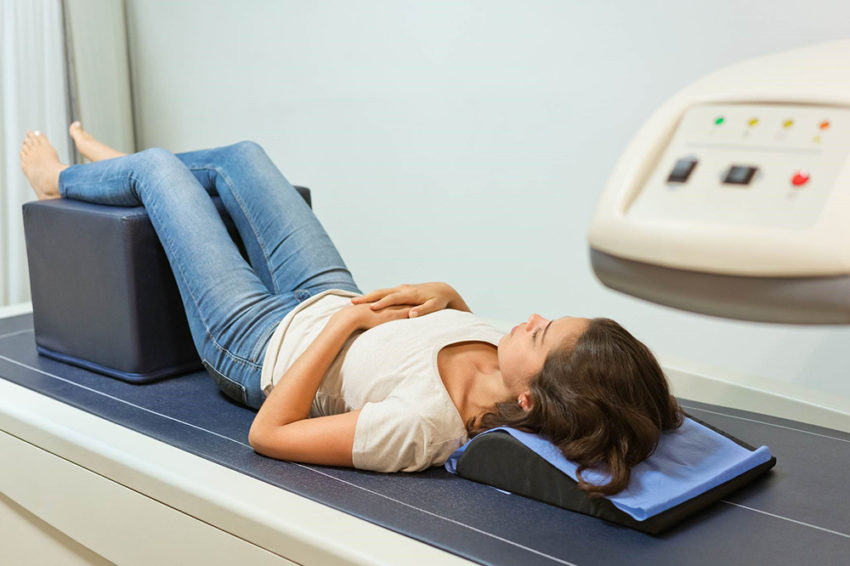A DEXA scan is a type of X-ray that is used to measure bone density, lean mass, and body fat. It is the most accurate way to diagnose osteoporosis, which is a condition that causes bones to become weak and brittle. Additionally, it is sought out by athletes and fitness enthusiasts to track the impacts of diet and exercise on their body composition. Below we will address the most common reasons why a DEXA scan is recommended.
What is a DEXA Scan?
DEXA stands for dual-energy X-ray absorptiometry.
A DEXA scan is a special kind of X-ray that is used to measure the density of bones, This test is also sometimes called bone densitometry or bone density test.
They can also test for lean and fat mass distribution throughout the body which are referred to as DEXA body composition scans.
When is a DEXA Scan Recommended?
There are two primary reasons to have a DEXA scan: to test bone density and to track body fat percentage.
For Measuring Bone Density and Risk for Osteoporosis
Your doctor may recommend a DEXA scan if you are experiencing any of the following symptoms:
- Unexplained bone fractures
- Loss of height
- Persistent pain in the bones or joints
- Recurrent joint pain or inflammation
- Decrease in mobility
If you are considered to be at risk for osteoporosis, your doctor may also recommend a DEXA scan. Some of the risk factors for osteoporosis include:
- Advanced age
- Family history of osteoporosis
- Being postmenopausal
- Having a small, thin frame
- Prolonged steroid use
- Eating disorders
- Smoking cigarettes
- Excessive alcohol intake
- Certain medications, such as corticosteroids
- Inactive lifestyle
- Certain medical conditions, such as rheumatoid arthritis, celiac disease, or anorexia nervosa
A DEXA scan is the most accurate way to diagnose osteoporosis and predict your risk for fractures. It is also used to monitor changes in bone density over time.
For Measuring Lean and Fat Mass in the Body
DEXA scans can also be used to measure body fat percentage. This information can be helpful for people who are trying to lose weight or gain muscle mass.
You may want to get a DEXA scan to measure body fat for the following reasons:
- Determine if your fitness program is achieving your muscle or fat loss goals.
- Determine if your eating habits are achieving your muscle or fat loss goals.
- A coach or athletic trainer requested to know your body fat percentage.
- A doctor recommended a body fat scan to determine the severity of obesity.
Body composition scans can also be used to monitor changes in body fat percentage over time.
Radiation Levels of A DEXA Scan
DEXA scans use very low levels of radiation. The amount of radiation you are exposed to during a DEXA scan is similar to the amount of radiation you are exposed to during a routine X-ray.
The risk of developing cancer from a DEXA scan is very low. The risk is so low that it is not even considered when deciding to have a DEXA scan.
Alternatives to a DEXA Scan Without Radiation
While a DEXA scan is considered the “gold standard” and recommended for measuring bone density and body fat percentage, there are non-radiation alternatives.
For bone density, an ultrasound can be used instead of a DEXA scan. Ultrasounds do not have radiation and can be ideal for women who are pregnant or trying to get pregnant.
For body fat, skinfold calipers and BIA devices can be used. While these devices are not as accurate, they do not have radiation. Hydrostatic testing is more accurate than a DEXA and does not involve radiation.
When is a DEXA Scan Recommended – Bottom Line
A DEXA scan is a special kind of X-ray that is used to measure the density of bones and can also test for lean and fat mass distribution throughout the body. A scan may be recommended if you are experiencing any unexplained bone fractures, loss of height, persistent pain in the bones or joints, recurrent joint pain or inflammation, decrease in mobility, or if you are considered to be at risk for osteoporosis. You can find a bone density scanning facility here.
The scan is also used to monitor changes in bone density and body fat percentage over time. The radiation levels from a DEXA scan are very low and the risk of developing cancer from a DEXA scan is so low that it is not even considered when deciding to have the scan. There are non-radiation alternatives for both bone density and body fat tests. Find a body fat testing facility here.
